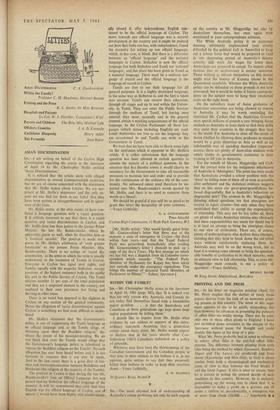Asian Discrimination C. A. Gunawardene
Within the Family?
Professor C. M. Maclnnes, Michael Baume Printing and the Press R. S. Austin, Sir Max Betnrose
Hospitals and Patients
Lt.-Col. W. .1. Fletcher, 'Consultant's Wife'
Parents and Children The Hon. Mrs. Michael Lyle Offshore Counties I. A. D. Kennedy Caribbean Rhapsody Henry Adler The Pyramids lane Baker
ASIAN DISCRIMINATION
Su ,—I am writing on behalf of the Ceylon High Commission regarding the article in the Spectator of April 14 by Mr. Christopher Hollis entitled `Asian Discrimination.'
It is noticed that the article deals with alleged discrimination in several Commonwealth countries, but we are of course concerned with the statements that Mr. Hollis makes about Ceylon. We are sur- prised at Mr. Hollis's statements and the only ex- cuse we can find for them is our belief that they have been written in misapprehension and in ignor- ance of the facts.
Mr. Hollis seems, at the very outset, to have con- fused a language question with a racial question. It is entirely incorrect to say that there is a racial question and racial discrimination in Ceylon, and Mr. Hollis does less than justice to the former Prime Minister, the late Mr. Bandaranaike, whom he apparently.knew so well, when he describes him as 'a fanatical racialist.' The position is made even worse by Mr. Hollis's attribution of 'even greater fanaticism' to the present Prime Minister, Mrs. Bandaranaike. There is no vestige of 'racial dis- crimination,' in the sense in which the term is usually understood, in the treatment of Tamils in Ceylon. Everyone in Ceylon has equal civil rights, and Tamils, equally with the majority Sinhalese. occupy positions of the highest eminence both in the public life and in the Public Service of Ceylon. The Tamil citizens number 11 per cent of the total population and they are a respected element in the country, not confined to their own provinces but living and thriving in other areas.
There is no racial ban imposed in the slightest in Ceylon on any section of the general community. Hence the allegation of 'racial discrimination' against Ceylon is something we find most difficult to under- stand.
Mr. Hollis's statement that `the Government's policy is one of suppressing the Tamil language as an official language and, as the Tamils allege, of imposing upon them the Buddhist religion.' dis- closes the extent of his misunderstanding. We do not think that even the Tamils would allege that the Government's language policy is calculated to impose the Buddhist religion on the Tamils! No such allegation has ever been heard before and it is too fantastic to conceive that it can ever be made.
And in the last resort there is a great deal of kin- ship and intercommunication between Buddhism and Hinduism (the religion of the majority of the Tamils). The position in Ceylon is that during the late Mr. Bandaranaike's time an Official Language Act was passed making Sinhalese the official language of the country. It will be remembered that until that time English was the official language of Ceylon, and of course it would have been highly and anachronistic- ally absurd if, after independence, English con-• tinued to be the official language of Ceylon. The move towards one official language was a natural development in the country and it might be pointed out here that India too has, with independence, found the necessity for setting up one official language, which, in her case, is Hindi. But there is a difference between an 'official language' and the national languages in Ceylon. Sinhalese is now the official language but both Sinhalese and Tamil are 'national languages', and due place has been given to Tamil as a national language. There must be a uniform lan- guage of record and the official language is the language of record in Ceylon.
Tamils are free to use their language for all general purposes. It is a highly developed language, in the same way as Sinhalese is, and the fact is taken into account. Tamils can receive their education, through all stages and up to and within the Univer- sity, in Tamil. They can enter the Public Services through the medium of Tamil, but having once entered, they must, naturally and in the general interest, obtain a working acquaintance of the official language. In the Ceylon Parliament all three lan- guages (which means including English) are used. Local Authorities are free to use the language they are accustomed to and Tamils can write to the Government in Tamil.
We trust that we have been able to throw some light on the confusion which is apparent in Mr. Hollis's article. It is rather unfortunate that the language question has been allowed in certain quarters to assume the aspects of a political question. In the situation that has thereby arisen it would clearly be
necessary for the Government to take all reasonable measures to maintain law and order and to provide
for the continuance of the ordinary life of the com- munity. No untoward intent need therefore be im- ported into Mrs. Bandaranaike's words quoted by Mr. Hollis, and there is no need to construe these words as a 'threat'.
We should be grateful if you will be so good as to grant this letter the hospitality of your columns. —Yours faithfully,
C. A. OUNAWARDENE
Press Attachd
Ceylon High Commission, 13 Hyde Park Gardens, W2 [Mr. Hollis writes: 'One would hardly guess from Mr. Gunawardene's letter that there was at the moment a state of emergency in Ceylon—the third within four years—and that the Tamil Federal Party was proscribed. Immediately after reading Mr. Gunawardenc's letter 1 chanced to pick up a copy of the day's Times. The first passage on which my eye fell was a dispatch from its Colombo corre- spondent which records: "The Federal Party Member of Parliament for Kopay has been taken into custody under the emergency regulations. This brings the number of detained Tamil Members of Parliament to fifteen." '—Editor, Spectator.]






































 Previous page
Previous page